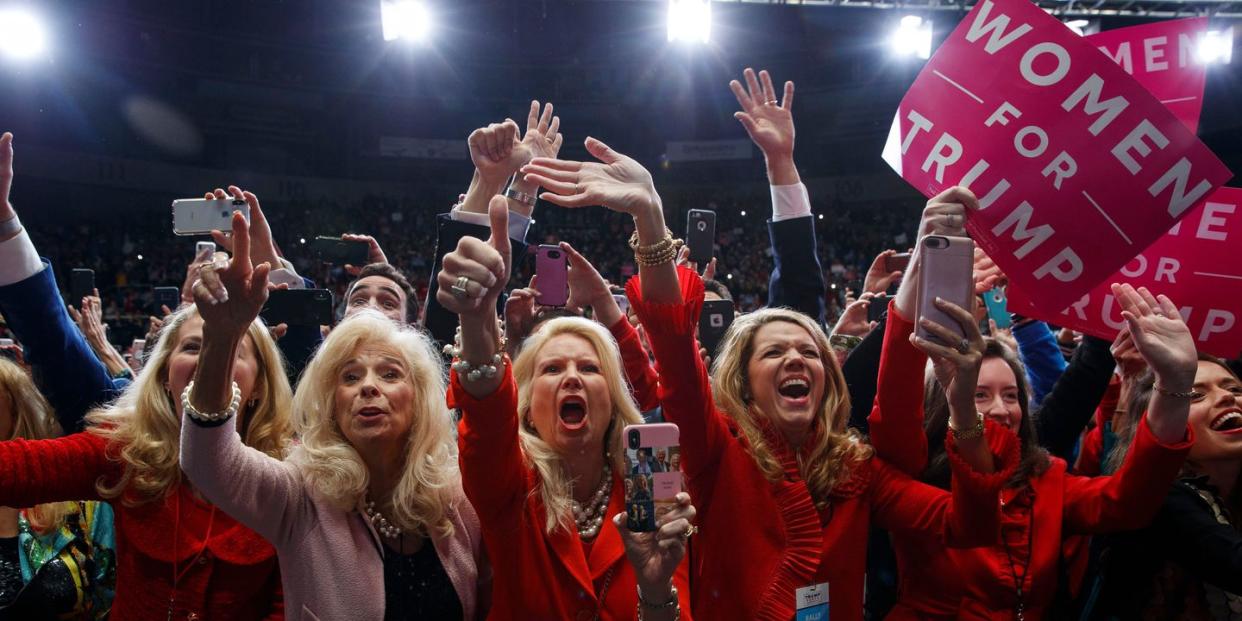It's 'The Year of the Woman,' No Thanks to White Women

In 1992, the year after Clarence Thomas was nominated to the Supreme Court over Anita Hill's allegations of sexual harassment, a record four women were elected to Senate. It was called the Year of the Woman. Coming off of Brett Kavanaugh’s Supreme Court nomination-over credible allegations of sexual assault by Dr. Christine Blasey Ford-some predicted that 2018 might be another year of the woman. Although more than 100 women were elected Tuesday, easily surpassing the previous record of 84, it feels wrong to call it that.
We could call it a year of women of color. It’s not just that non-white Democratic candidates-Sharice Davids, Rashida Tlaib, Letitia James, and more-broke historic barriers of gender, religion, age and sexuality. It’s that white women emphatically did not elect Democrats in certain key races. In the Georgia gubernatorial race, 75 percent of white women voted for Brian Kemp over Stacey Abrams, according to CNN exit polls. In Texas, 60 percent voted for Senator Ted Cruz over Beto O’Rourke. Fifty-one percent voted for Ron DeSantis to be governor of Florida over Andrew Gillum. I would understand if women as a whole decided to divest from white women.
It’s strange that these numbers continue to surprise and disappoint me. Although many liberals take it as an article of faith that Democrats represent women’s interests, white women have long backed Republican presidential candidates and 53 percent of us voted for Donald Trump.
White women: footsoldiers of the patriarchy.
Brian Kemp: 76%
Ted Cruz: 59%
Ron DeSantis: 51% pic.twitter.com/1RTZlppkiZ- Mona Eltahawy (@monaeltahawy) November 7, 2018
In retrospect, I think I was hoping white women who voted for Trump wouldn’t matter. After Hillary Clinton lost, Democrats debated among themselves: Is it more important to persuade swing voters or turn out unlikely ones? As someone who felt ambivalent about Clinton’s leftist bona fides, I saw the value in the latter path. Support progressive candidates of any gender who have a strong message and can get people excited, the thinking went, and watch the woman-friendly policies roll in. And to a large extent, it worked. Forty-nine percent of white women voted for Democratic House candidates, compared to 43 percent in 2016. Abrams, O’Rourke, and Gillum achieved historically thin margins in Republican strongholds with historic voter turnout and in spite of serious voter suppression efforts.
Still, seeing these three pro-woman candidates soundly rejected by white women, at the cost of winning, makes me realize that perfect candidates and campaigns might not be enough. Voter reform is an urgent first step towards getting ourselves out of this mess. But asking progressive candidates to turn out enough voters to cancel out white women's votes now looks like letting myself and other white women off the hook. Considering how white women might have tipped the scales in some races, it seems we are long overdue for a turn persuading other white women that progressive politics have something to offer them, or their nieces and nephews, or their grandchildren.
For white women who, like me, are looking for marching orders, there are organizations doing this work: Stand Up for Racial Justice, GALvanize USA, and more listed in this excellent Twitter thread. I also think we need to further untangle the knot of white pop culture feminism and Democratic politics that formed leading up to 2016. Not all women like Lena Dunham, or Katy Perry, or Amy Schumer, it turns out-I rarely like all three at the same time-and, more importantly, they look nothing like the people leading the left. I also worry that I personally focus too much on reproductive justice, paid family leave and the wage gap. It’s not that I think those are the only important issues, but they seemed like the easiest way to get other women on board. I no longer think that’s true.
Some of the white Republican women I know have largely relied on men financially and are afraid of the way the world their white sons will inherit is changing. The issues that directly affect me (see above) aren’t relevant to the way their lives played out. They have major blind spots around poverty, race, and trans rights that they may never overcome through lived experience or political persuasion. Still, I’m optimistic that their compassion for people without health care, people affected by gun violence and people subject to inhumane immigration policies could translate to us voting similarly. At the very least, we have this melting planet in common.
Other white Republican women, I think, care about preserving their wealth and the supremacy of their race at the expense of every other issue, including this melting planet. I don’t want to strike a political bargain with them. Disconnecting from some white women might be as important as connecting with others. This is the danger of thinking of women like a bloc: “woman” isn’t a very high standard. Women are human, and so lots of women are selfish. Who would want to be part of a year of the woman if all women were invited?
('You Might Also Like',)

